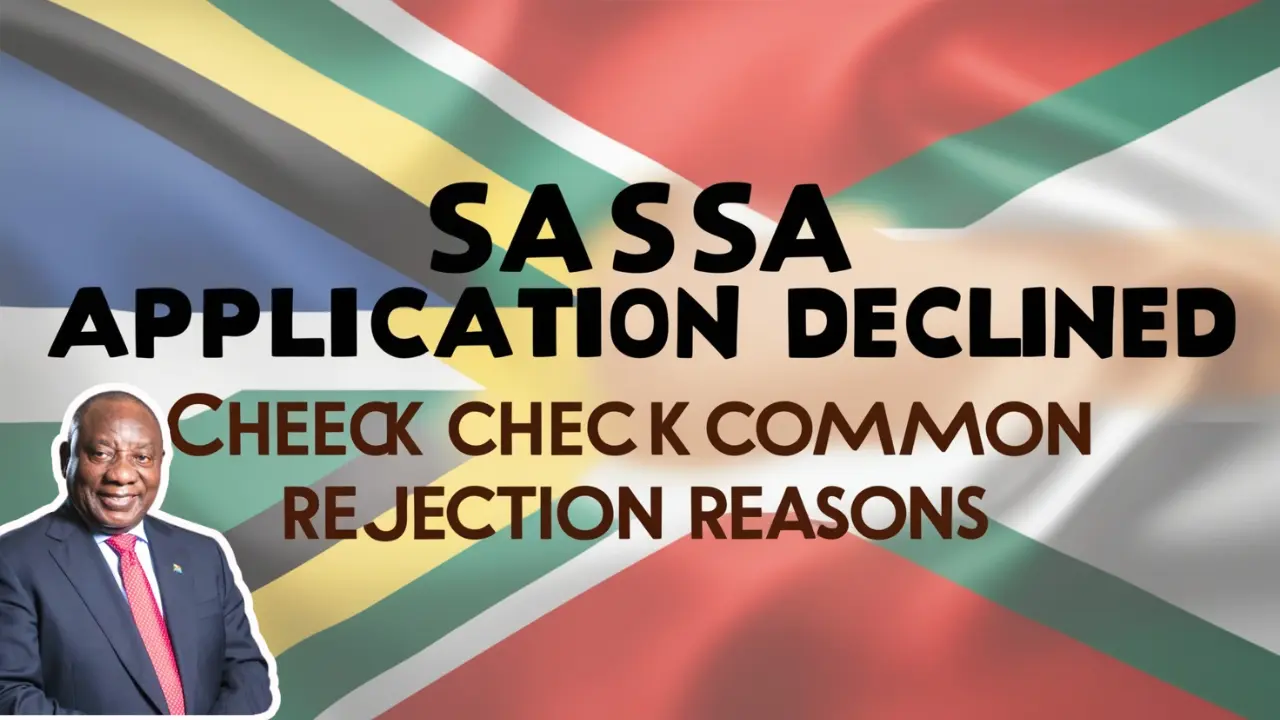Applying for a SASSA grant can provide much-needed financial relief for many South Africans, especially during tough times. However, receiving a notification that your application has been rejected can be disheartening. The good news is that a rejection isn’t the end of the line; there are still options available for you. By understanding the reasons behind the rejection and knowing how to navigate the appeal process, you can increase your chances of approval.
SASSA grants are intended to assist those in need, but not every application is successful on the first try. Various factors, from missing information to eligibility issues, can lead to a denial. Understanding what went wrong helps you rectify errors and strengthen your case during an appeal.
Table of Contents
- Understanding the Reasons for the Grant Rejection
- What to Do After Rejection
- Important Considerations During the Appeal Process
- Contact SASSA for Help
- Common Mistakes to Avoid
- Alternatives If Your Appeal Fails
Understanding the Reasons for the Grant Rejection
SASSA applications can be rejected for several reasons. Below are some of the most common causes:
- Incomplete Paperwork: Missing or incorrectly filled out sections on your application form can lead to automatic rejection.
- Incorrect Banking Details: If your banking information is inaccurate or incomplete, SASSA will be unable to verify your details or process payments.
- Identification Issues: Mismatches between your application details and the Department of Home Affairs records can result in rejection.
- Means Test Failure: If your income or assets exceed the eligibility threshold, your grant application may be denied.
- Alternative Income Source: If you receive other forms of income or are already on a different grant, you may be disqualified.
- Age Restrictions: Specific grants have age limits, such as those for child support or unemployment assistance.
- Fraud Concerns: Any discrepancies or suspicions of fraudulent activity can cause your application to be rejected.
- Government Data Conflicts: Issues with other government agencies, like discrepancies with the Unemployment Insurance Fund (UIF), could lead to a denial.
What to Do After Rejection
If your application has been rejected, don’t be discouraged. You have the right to appeal the decision, and many applicants have been successful in securing grants upon reconsideration.
If your application was denied, it’s important to act quickly. You can appeal within 30 days of receiving the rejection notice. Follow these steps to submit your appeal:
- Log into the SASSA Services Portal: Visit the official SASSA website.
- Enter Your Details: Input your ID number and mobile phone number.
- Verification: A one-time PIN (OTP) will be sent to your phone; enter this to proceed.
- Select the Month for Appeal: Choose the specific month that was denied.
- Provide Reason for Appeal: Select the reason for the appeal from the list provided.
- Submit Appeal: After filling in all the required information, submit the appeal.
Note: The appeal process can take up to three months, and you will be notified of the outcome via SMS or email.
Important Considerations During the Appeal Process
- Stay Persistent: There’s no limit to how many times you can appeal. If you believe your application was wrongly denied, don’t give up.
- Double-Check Your Documents: Ensure all information is accurate and up to date to avoid rejection due to simple mistakes.
- Track Payment Dates: Stay informed about grant payment dates to plan your finances accordingly.
Contact SASSA for Help
If you have questions about your application, appeal, or payment status, SASSA offers several contact channels:
- Toll-Free Call: 0800 60 10 11
- SASSA Head Office: 012 400 2322
- Email: grantenquiries@sassa.gov.za
Keep records of all your correspondence and documents related to your application and appeal, as this can be useful if further issues arise.
Common Mistakes to Avoid
Here are some common errors that often lead to application rejections:
- Missing Deadlines: Missing application or appeal deadlines can forfeit your chance to apply for the grant.
- Wrong Information: Incorrect banking or identification details are common reasons for denial. Always verify your information before submitting.
- Not Meeting Eligibility Criteria: Ensure you meet the specific requirements for the grant you’re applying for, as each grant has different eligibility conditions.
Alternatives If Your Appeal Fails
Once you’ve submitted your appeal, SASSA will review your application along with any new documents or details you provide. This process can take up to 90 days. If your appeal is successful, you will receive payments for the months that were originally declined. However, if your appeal is unsuccessful, you can reapply if your circumstances change.
If your appeal is denied and you’re still facing financial hardship, there are other forms of support you can explore:
- Unemployment Insurance Fund (UIF): If you have recently lost your job, you might qualify for UIF benefits.
- NGOs and Community Support Programs: Many local non-profits offer food assistance, shelter, and other services.
- Local Government Assistance: Check with your local municipality for any available aid programs.
Conclusion
Although receiving a rejection for your SASSA application can feel discouraging, it’s not the end of the journey. The appeal process is designed to ensure fairness, and many applicants successfully secure grants after reconsideration. The key is to act promptly, follow the correct procedures, and stay informed about your rights and available options.
With persistence and proper documentation, you can navigate the appeal process and secure the financial assistance you need. Always remember that you have the right to appeal, and other support systems are available to help during difficult times.



